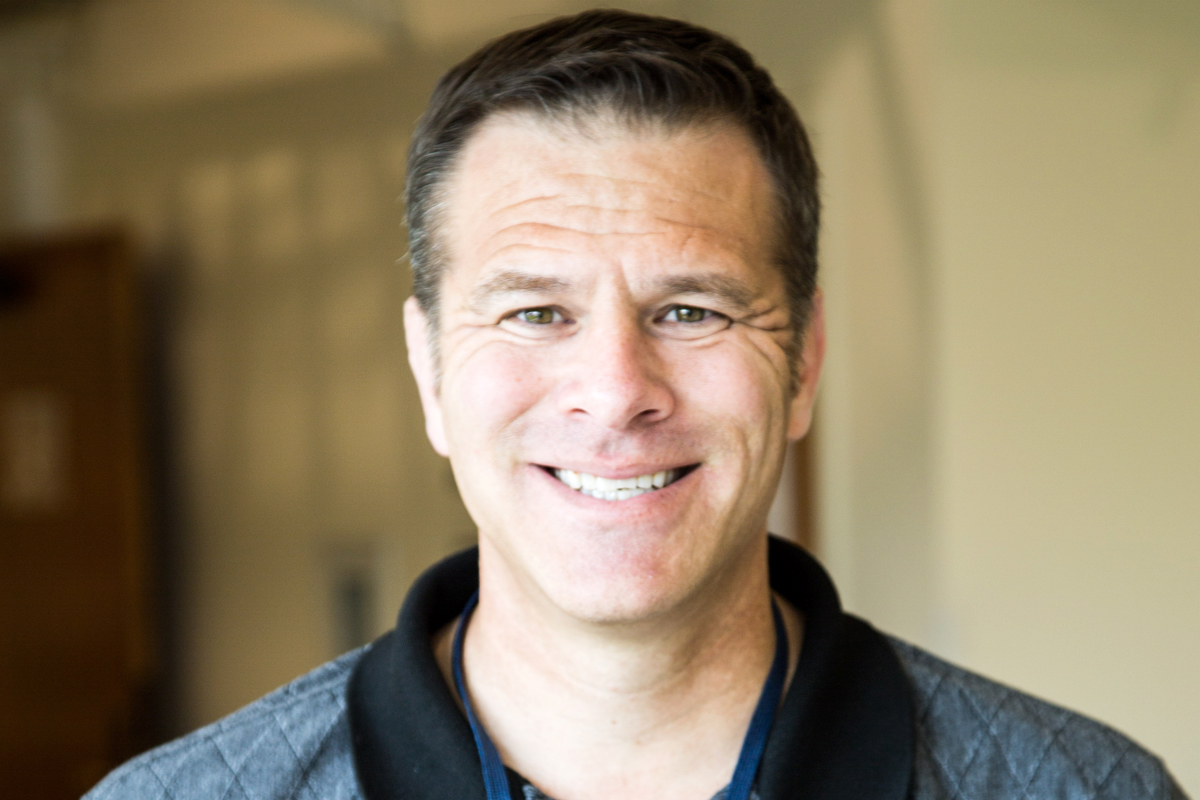When asked how things are going in his first year of studying to become a physician assistant, MEDEX Tacoma Class 3 student Doug Aguirre pauses, considers, then answers with a wry smile, “Well, I’m still in the class.”
“It’s a difficult course,” he admits. “Sometimes I feel like I’m riding a tidal wave, and I just don’t want to crash. I’m fine on my clinical skills. I was a medic for quite a while in the military, so I’m very good with hands-on. It’s just some of these books, they’re … rough.”
Of course, this isn’t the first “rough” patch that Doug Aguirre, a military veteran with some 22 years of service under his belt, has worked his way around. He joined the Army at the age of 17, left home to start training at 18. Stationed at Fort Lewis, Doug became an RTO, then a team leader, then a Ranger squad leader. Five years in, Doug left the military to “try college. And that was fun … but I liked the military.”
So in December 2000, it was back to the Army for Doug Aguirre, this time as a Special Forces medic. “I heard it was the hardest thing they had, and I wanted to see if I could do it. That was it. There was no war on at the time and I was like, ‘Well, I’ll be a medic for a while. Then if I get out, I could be a fireman or a paramedic.”
“I heard it was the hardest thing they had, and I wanted to see if I could do it. That was it. There was no war on at the time and I was like, ‘Well, I’ll be a medic for a while. Then if I get out, I could be a fireman or a paramedic.”
As advertised, training to become a medic proved to be “phenomenally difficult.”
“It’s like being a MEDEX student in terms of academic rigor, but you have to wake up every morning at 5:00 am to do PT after late night study sessions. You’re still doing the military thing at the same time. And you have to apply military tactics to medicine, which is a whole other field of insanity. But yeah, I loved it. I loved every second of it. And then I got put on a team, and went to Iraq.”
Doug did tours in Iraq and Afghanistan, spent time in Southeast Asia, and then Africa, all while going to college and being a father. Altogether he spent nearly 6 years overseas. He worked quite a bit with foreign military and both US and foreign governmental agencies, some of it classified.
“I can say there was nothing really glamorous or sexy in terms of what I did,” Doug says. Still, there was much to enjoy. “I loved it,” he says. “I loved being with all the people, whether it be doing medical stuff or operations. I liked being at the lowest level where I could work with people.” It was during that time that he gained rank and moved into leadership as a Special Forces warrant officer.
“I loved it,” he says. “I loved being with all the people, whether it be doing medical stuff or operations. I liked being at the lowest level where I could work with people.”
“I decided on my last tour that I was going to do something different, something I could do back in the States. I thought maybe I’d get my nursing degree in advanced nursing to be a nurse practitioner. I’ve got two kids, and for the first six years of their lives, I was gone three of them. And I was like, ‘I gotta be around for the kids because I want to see them. I want to see what they do.’ And then, I came back.”
We wonder when the idea of becoming a PA arose for him?
“We had a couple of PAs in my Special Forces group who had gone to MEDEX, and I was like, ‘Wow, that seems like a great job because they’re super smart. They still get to come out with the teams and do stuff, but their medical skills were just phenomenal.’ I was like, ‘I want to do that.’ So I actually applied to MEDEX in 2005, but I wasn’t accepted.”
So Doug continued with Special Forces and deployed a few more times. For his next application to MEDEX he made a concerted effort to buckle down on his studies. Almost eight years had passed, so he had to retake anatomy and physiology, chemistry, and other prerequisites. “I really wanted to get in this time, so I prepped myself and read all these books on how to interview,” he says.
Doug pauses, smiling again. “And this time it worked. Knock on wood, luck of the gods, however you want to say it. They were like, ‘Yeah, we’ll take you’.” We suggest that perhaps there was more than just luck involved in this instance. Maybe hard work has something do with it?
“Yes, there was that,” Doug allows. “But I met a lot of people interviewing— very intelligent, very capable people. And when you get there and you think, ‘I’m a smart guy and I’ve got tons of experience,” well, they’ve all got tons of experience and they’re all super smart, too. So …”

We ask Doug to reflect on his being one in a long line of veterans coming out of the military and into the MEDEX program over the past 46 years, and to consider what he brings to MEDEX, and to the PA profession more generally, as a veteran. “Well, if you’re a veteran, you’re a little bit older, you’ve been around for awhile, and so you bring thousands of hands-on hours with you. You’re around people constantly. You’re treating people in the worst places, at the worst times, and you’re doing it through an interpreter. They’ve got strange diseases, and you’re helping them out, and they love it. You get that good feeling of satisfaction. I think a lot of us veterans, we just have it.”
Now, as he prepares for the upcoming year of clinical rotations, we wonder where Doug Aguirre might see himself winding up as a certified physician assistant. “Well, I don’t want to jinx myself, but I really like pediatrics and primary care,” he says. “I think kids are great. But if you want to help people out when they get older, you try to teach them while they’re young. And I like a more rural area just because I like the outside. If I have to travel to see my patients, certain distances, I have no problem with that. As long as you’ve got a four-wheel drive vehicle, I think you’re all right.”
And so it follows that Doug’s 4-month family practice placement is to be in Montana. “Montana, yeah. My clinical coordinator asked me if I really wanted it, and I told her I did. I’m so excited to go out there. I love the area itself. It’s big sky country. What more could you want?”

